De-tracking your website

There’s a myriad of blog posts, articles, books, videos, and courses devoted to teaching you how to measure your traffic, audience, and conversions through analytics and tracking cookies. Today, I want to propose to you the exact opposite, de-tracking your website (in the absence of a better term).
This same page you are reading right now is completely analytics-free. There’s not a single tracking cookie to be found on Micropreneur Life.
Wait… What? De-what-my-site? Why?
If you are around my age, or older, you will remember a time when the Internet was not a dystopian tracking system, when people had a website because they truly wanted to write about something and share their thoughts, knowledge, or experience with others. An internet where Google didn’t dictate the content, style, and aspect of every publication. A true network of networks that served its original purpose of bringing us together instead of turning us into data cows to milk for targeting advertising, political goals, or social experiments.
If you are younger than me, you may not remember this world, but you may wonder how it would look like.
Soshana Zuboff, in her book “Surveillance capitalism“, describes this new form of capitalism, that tech companies such as Google and Facebook pioneered, based on the endless collection, amalgamation, and exploitation of our personal data.
The consequences of the application of this (not so) new economic model at scale are not only the obvious threat to our privacy, or the manipulation of democratic processes. The increasing polarization of us as individuals and our society at large, or the filter bubble, are some of the other undesirable long-term effects. As Uthsav Chitra and Christopher Musco affirm:
…to increase user engagement, social media companies connect users with ideas they are already likely to agree with, thus creating echo chambers of users with very similar beliefs.
But not only social media platforms. Infotainment sites and streaming services such as Netflix or Spotify design algorithms to serve you more of the same. Ironically, in an era when we have access to an unprecedented level of information, we are trapped in our chamber echoes.
If I had been born in 2001 instead of 1980, I wouldn’t probably know Arvo Pärt, Miles Davis, Explosions in the sky, or The Soft Machine. I would probably be listening to rock music because that’s what I started to listen to when I was 15.
Ok, ok, so what does any of that have to do with our websites?
If you are selling a product or service and you really need to measure your conversion rate or track the behavior or interests of your visitors, it may make perfect sense to use Google Analytics or any other tracking solution. That’s completely normal.
However, not every webpage should aspire to that. As publishers of content, we need to consider if our sites pursue a commercial interest or not and, even if they do, if it requires tracking our users or customers. Are you truly using this information in a useful and profitable way?
We are mindlessly feeding this machine in exchange for rewards without stopping to wonder if it’s worth it. Millennials have grown up with the promise of earning passive income without needing to work thanks to a travel blog or an Instagram account. “Anyone can play guitar” has become “Anyone can earn money with a YouTube channel teaching others to play guitar”.
When Europe passed the GDPR law, suddenly all websites started showing these annoying dialogs asking you to accept all cookies or navigate through a nightmarish selection of switches, checkboxes, and buttons to disable the thousands of tracking cookies put there by the website owners and their partners. What a pain in the ass! We collectively claimed. Didn’t Europe had anything better to do?
Only… the problem is not Europe or the European laws. It’s the websites.
Open Mozilla Firefox, clean all cookies, and navigate to any newspaper, like the Huffington Post.
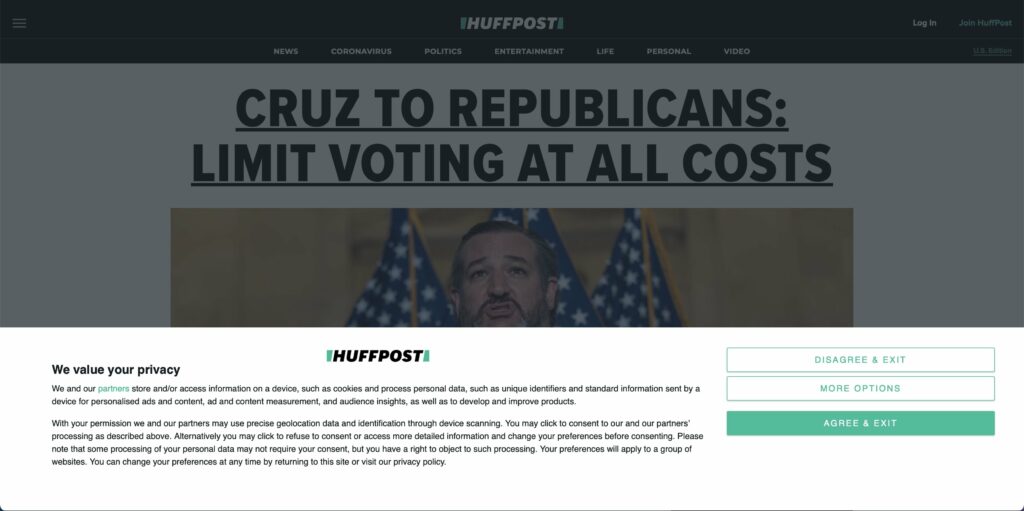
Instead of mindlessly clicking on “Agree & exit” to access the content, click on “More options”. You’ll be presented with not only a myriad of “consent” options and literally hundreds of partners that are accessing your information and building a profile of you to serve you highly targeted ads. You will also see the “Legitimate interest” options.
So what’s this “Legitimate interest”? Obviously, the companies behind this massively profitable market were not going to allow something as ephemeral as the European legislation to ruin their business, so they pushed for the creation of this “Legitimate interest” concept, which basically allows them to collect your information anyway, even if you don’t give your consent, alleging “legitimate interests” to collect and own that data.
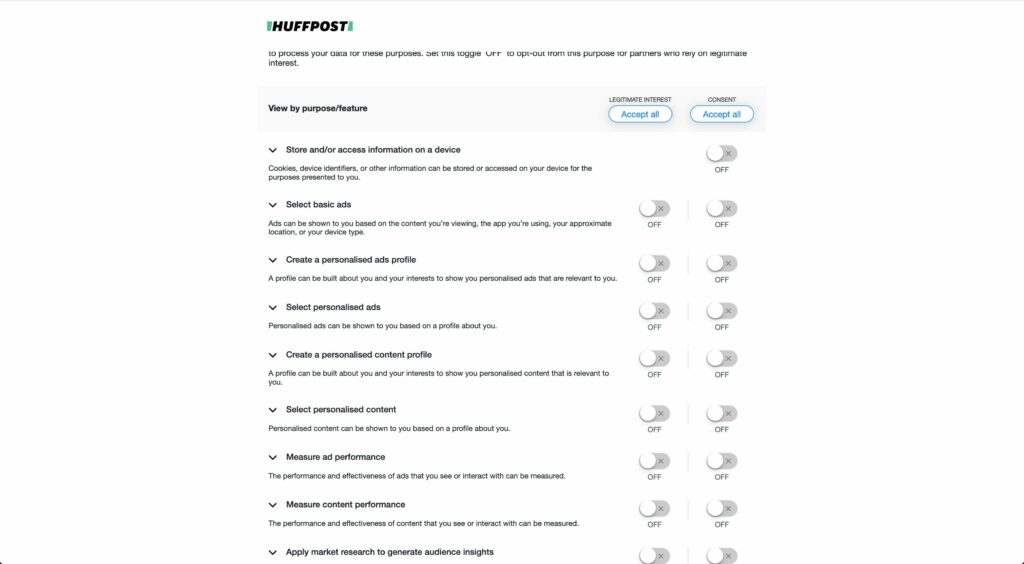
To object to this legitimate interest, you have to click yet another button or, in the worse case scenario, disable these checkboxes one by one. It’s scary that things such as creating a personalized ad profile of you, or selecting personalized content are considered “legitimate”.
These lobbying efforts are also the reason why companies such as Facebook are allowed to not display this type of dialogs to their users. Their main and only business is precisely collecting this information from you to build a profile of you for targeted advertising. In other words, they cannot function without violating your privacy and tracking your every move on their platform and, sometimes, any other website where someone has placed one of their pixels.
But what does this have to do with me or you?
We are all responsible
Not only social media platforms, newspapers, infotainment sites, search engines, streaming services and the like do this. Every small publisher today adheres to the holy laws of SEO, tracking and analyzing traffic.
Even if just a few people can earn a decent living doing that, we still try. We launch a new travel blog, a new Instagram profile, a new app to look for events, and we pledge to Surveillance Capitalism. We add Google Analytics to our site and every possible plugin in the book to understand the behavior of our “audience”. Even if our audience is ridiculously small and we will abandon our project after some months. The goal is not sharing anything, it’s pursuing this “magic revenue” dream.
Most of the time that’s not even what we want. The problem is how we have transformed the internet into this marketing network where, with few exceptions (such as Wikipedia), every site has to pursue a commercial interest.
De-tracking your website
So I decided I didn’t want to be part of that dystopian network anymore, not at least on Micropreneur Life. This blog has served me to build an audience and launch a business. Everything I’ve achieved on Companio is due to these posts. However, I have never ever had a look at Google Analytics beyond a casual look. I have no idea why I added it to my blog, to begin with. It’s just “something you’ve got to do”.
I opened the site on Firefox and it showed me some of the “Tracking content” I was using. If I was not using Google Analytics (or getting any value out of it)… why was I tracking my users and giving Google information about them? It didn’t feel right.
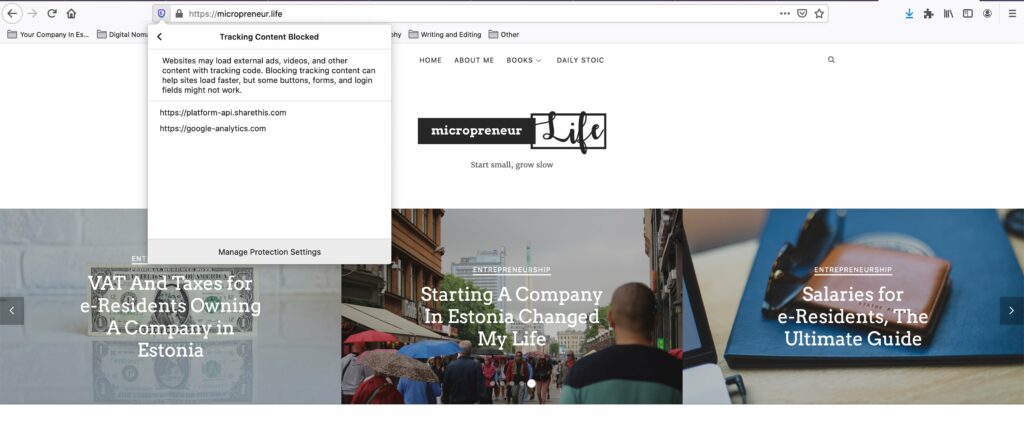
Removing (Google) analytics
So the first step was removing the Google Analytics plugin and closing the associated Google account (an extra bonus). I also removed other tracking plugins that were recommended either by Google Analytics or by the theme that I was using.
If you want to de-track your site, you need to get rid of Google. Ruthlessly.

Removing other tracking plugins
There are many other plugins that add tracking cookies to your site. Most of them are not even useful, or the blog can perfectly work without them. I disabled them all.
Removing social media plugins, pixels, and analytics code
Virtually all social media platforms will insert their tracking pixels on your website. I don’t use any social network but, if you do, you should remove them from your website, including any plugins, pixels, or tracking code you may be using.
If you want to share things on social media and engage with your audience there, simply add links (plain old links) to your social media accounts. That will do without adding these annoying tracking cookies.
Checking your website on a cookie checker
When you’ve eliminated the most obvious cookies, you should check your site for cookies. Depending on your IT skills, you can check your site on a cookie checker (ironically, all these checkers contain large numbers of cookies to track you. They are selling their products too) or simply use the browser.
In my case, there were cookies from Stripe and Buy me a coffee.
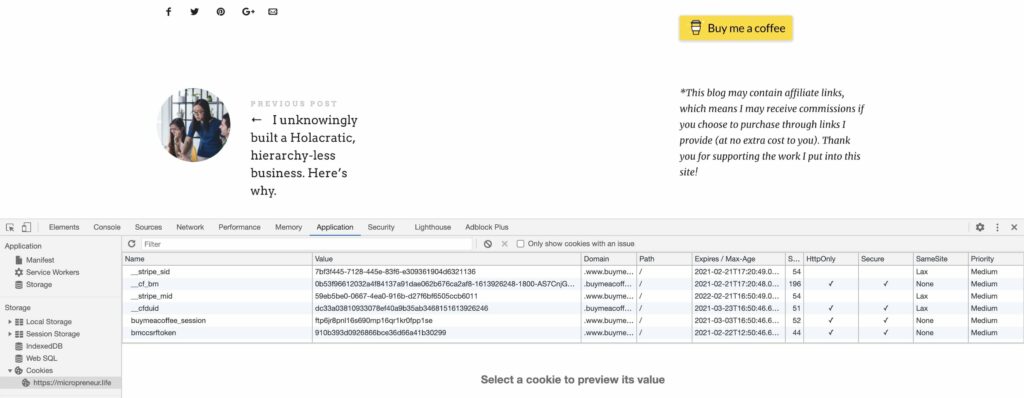
I realized these cookies were added by the “Buy me a coffee” button I added to the website to accept donations. As I am not honestly going to become rich any time soon with the occasional donation (for me, they are mostly a way of receiving a sincere “Thank you” for this content), I considered removing it altogether.
Instead, I decided to add my own “Buy me a coffee” button. I looked for the coffee icon and, fortunately, it was out there in vector format (SVG). So I opened Sketch and two minutes later I had a button that looked mostly the same as the original, but without any added cookies, caffeine, or sugar 😄. I added a simple link to my “Buy me a coffee” page, and I was ready to go!
Smooth as a baby’s bottom
After all my efforts, I cleared the cache, launched Firefox again, and there it was, a shiny website without a single cookie. You can navigate my site resting assured that I won’t show you one of those annoying popups.
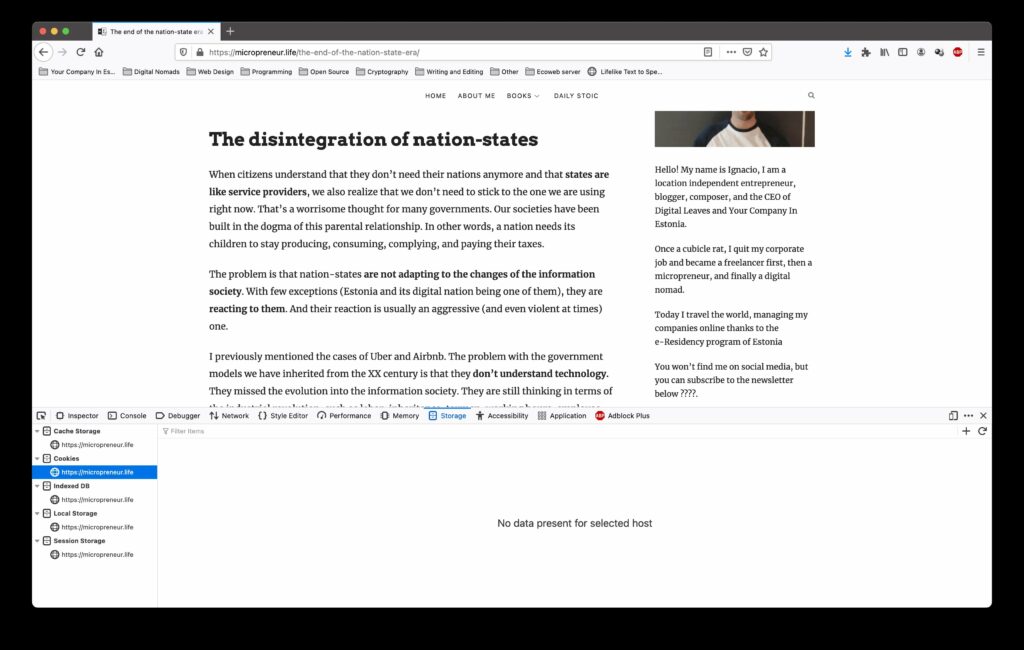
As I mention in my book, Less, living a minimalist existence consists of constantly asking “Why?”. Do I need this? Why?. What do I want to achieve with my blog, website, or app? Why am I doing this? I think this philosophy is useful for every other aspect of our lives.
That also made me wonder if I was really earning a relevant revenue with the affiliate links from Amazon and the like… and the answer was no (I have a business, I can live without those 20-30€/month, thank you). So I also got rid of them.
I don’t expect most people to understand why I did this. They will probably say “You are not hurting anyone, and you are putting a lot of effort into that content, why not monetizing it?”. But I’ve gotten to a point where doing what I think is right, and putting genuine content out there, just for the sake of sharing it with others, is more important than 30€.
Conclusion
Some weeks ago, I de-tracked my site. I got rid of Google Analytics and all other tracking cookies. In fact, I completely removed all cookies from my website. In this article, I explain why, and how you can do the same if it feels right to you.




Comments ()